Osgoode faculty author some of the leading legal scholarship in Canada. The repository contains a large collection of faculty scholarship including popular media, articles, presentations, and more. The following exhibit highlights the faculty books collection of items published by past and current faculty members at Osgoode. Several faculty members have also created open educational resources made available through open textbook platforms. Visit the Osgoode Digital Commons to see the full collection.
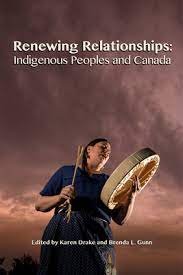
Renewing Relationships: Indigenous Peoples and Canada
Karen Drake
Brenda L. Gunn
This edited collection features essays by Indigenous legal academics from across Canada about renewing relationships between Indigenous peoples and Canada. Some Indigenous nations might embrace principles of reconciliation as reflecting a renewed relationship, while others reject the concept of reconciliation and instead advocate for resistance or decolonization. This collection includes chapters that critically engage with these theoretical debates, as well as chapters that analyze how these concepts can be instantiated in tangible and specific ways. It builds on existing literature on Indigenous-Crown relationships that addresses issues such as the inclusion of Indigenous laws, self-determination, and the role of the constitution. The chapters explore questions such as: What does a renewed relationship look like in modern Canadian society? What is the role of Indigenous law in renewing the relationship between Indigenous peoples and Canada? What does the United Nations Declaration on the Rights of Indigenous Peoples contribute to an understanding of a renewed relationship? How do treaties define Indigenous-Crown relationships? What shifts must occur within Canadian institutions to move away from the current colonial relationship?
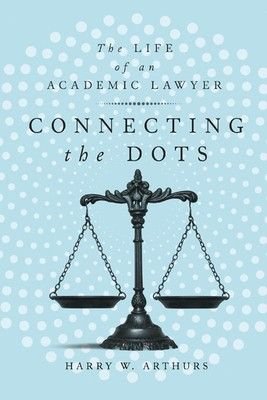
Connecting the Dots: The Life of an Academic Lawyer
Harry W. Arthurs is a name held in high esteem by labour lawyers and academics throughout the world. Although many are familiar with Arthurs's contributions and accomplishments, few are acquainted with the man himself, or how he came to be one of the most influential figures in Canadian law and legal education.
In Connecting the Dots Arthurs recounts his adventures in academe and the people, principles, ideas, motivations, and circumstances that have shaped his thinking and his career. The memoir offers intimate recollections and observations, beginning with the celebrated ancestors who influenced Arthurs's upbringing and education. It then sweeps through his career as an architect of important reforms in legal education and explores his research as a trailblazing commentator on the legal profession. Arthurs analyzes his experiences as a legal theorist and historian and his pivotal role as a discordant voice in debates over constitutional and administrative law. Along the way, he muses on the intellectual projects he embraced or set in motion, the institutional reforms he advocated, the public policies he recommended, and how they fared long term.
Framed with commentary on the historical context that shaped each decade of his career and punctuated by moments of personal reflection, Connecting the Dots is a humorous, frank, and fearless account of the rise and fall of Canadian labour law from the man who was at the centre of it all.
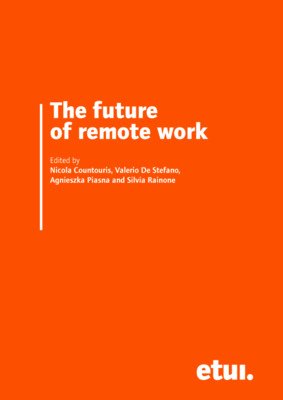
The Future of Remote Work
Nicola Countouris, University College London
Valerio De Stefano, Osgoode Hall Law School of York University
Agnieszka Piasna, European Trade Union Institute
Silvia Rainone, European Trade Union Institute
Debates on the future of work have taken a more fundamental turn in the wake of the Covid-19 pandemic. Early in 2020, when large sections of the workforce were prevented from coming to their usual places of work, remote work became the only way for many to continue to perform their professions. What had been a piecemeal, at times truly sluggish, evolution towards a multilocation approach to work suddenly turned into an abrupt, radical and universal shift. It quickly became clear that the consequences of this shift were far more significant and far-reaching than simply changing the workplace’s address. They involved a series of rapid, blockbuster transformations that were going to outlast the ‘mandatory lockdown’ phase of the pandemic.
The 12 chapters collected in this volume provide a multidisciplinary perspective on the impact and the future trajectories of remote work. They raise, discuss and explore fundamental questions emerging around remote work: from the nexus between the location from where work is performed and how it is performed to how remote locations may affect the way work is managed and organised, as well as the applicability of existing legislation. Additional questions concern remote work’s environmental and social impact and the rapidly changing nature of the relationship between work and life.
The contributions in this edited volume develop along several complementary axes, ranging from the discussion of global and societal dynamics to the implications for the contractual relationship between employers and workers. The transformation of the spatial component of work is considered both as a potential paradigm shift for the world of work and as a challenge for the implementation of specific regulatory regimes. An important insight that emerges from the multidimensional approach of this volume is that the establishment of a worker centred future of (remote) work requires the exploration and development of constructive pathways at different levels and in different directions involving the role of regulators, courts, trade unions, researchers, businesses and workers themselves.
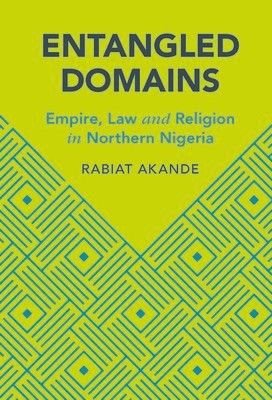
Entangled Domains: Empire, Law and Religion in Northern Nigeria
Set in Colonial Northern Nigeria, this book confronts a paradox: the state insisted on its separation from religion even as it governed its multireligious population through what remained of the precolonial caliphate. Entangled Domains grapple with this history to offer a provocative account of secularism as a contested yet contingent mode of governing religion and religious difference. Drawing on detailed archival research, Rabiat Akande vividly illustrates constitutional struggles triggered by the colonial state's governance of religion and interrogates the legacy of that governance agenda in the postcolonial state. This book is a novel commentary on the dynamic interplay between law, faith, identity, and power in the context of the modern state's emergence from colonial processes.
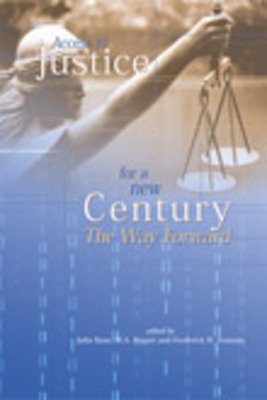
Access to Justice for a New Century: The Way Forward
Julia H. Bass, Law Society of Upper Canada
W. A. Bogart, University of Windsor, Faculty of Law
Frederick H. Zemans, Osgoode Hall Law School of York University
This book is a timely addition to the literature on access to justice. The book's essays address all aspects of the topic, including differing views on the meaning of access to justice; ways to improve access to legal services; litigation and its role in achieving social justice; and the roles of lawyers, citizens, and legal institutions. Access to Justice for a New Century is based on papers given at an international symposium presented by the Law Society of Upper Canada, sponsored by the Law Foundation of Ontario.
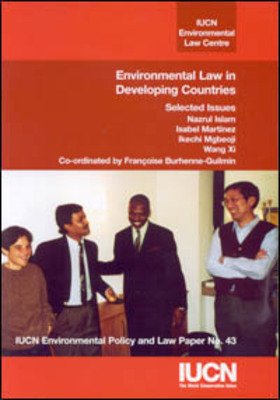
Environmental Law in Developing Countries: Selected Issues
Ikechi Mgbeoji, Osgoode Hall Law School of York University
Nazrul Islam
Isabel Martinez
Wang Xi
This publication contains four papers on different legal issues of interest to developing countries. The papers were researched and written by four Carl Duisberg Gesellscaft (CDG) Fellows who came to Germany from Bangladesh, Venezuela, Nigeria and China to study under the host leadership of the IUCN Environmental Law Centre. Subjects chosen by these Fellows vary widely, and cover ISO 14001, access to environmental justice in Latin America, patents and plant resources-related knowledge, and law and policy of the European Union on the reduction of greenhouse gas emissions and their significance to China.
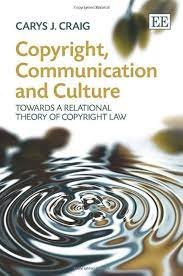
Copyright, Communication and Culture: Towards a Relational Theory of Copyright Law
In this provocative book, Carys Craig challenges the assumptions of possessive individualism embedded in modern day copyright law, arguing that the dominant conception of copyright as private property fails to adequately reflect the realities of cultural creativity.
Employing both theoretical argument and doctrinal analysis, including the novel use of feminist theory, the author explores how the assumptions of modern copyright result in law that frequently restricts the kinds of expressive activities it ought to encourage. In contrast, Carys Craig proposes a relational theory of copyright based on a dialogic account of authorship, and guided by the public interest in a vibrant, participatory culture. Through a critical examination of the doctrines of originality and fair dealing, as well as the relationship between copyright and freedom of expression, she explores how this relational theory of copyright law could further the public purposes of the copyright system and the social values it embodies.
This unique and insightful study will be of great interest to students and scholars of intellectual property law, communications, cultural studies, feminist theory and the arts and humanities.
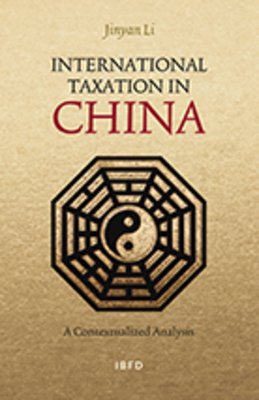
International Taxation in China : A Contextual Analysis
Jinyan Li
Chinese tax law affects corporations engaged in cross-border transactions with China. It may also impact the development of the international tax regime as China is increasingly engaged in international tax reform efforts, such as the G20/OECD BEPS Project. Chinese tax law is thus important to taxpayers, tax professionals and policymakers worldwide. However, it is a challenge to find comprehensive information and insightful analysis of Chinese tax law in English. International Taxation in China: A Contextualized Analysis meets that challenge. This book deals with the Chinese international tax regime, focusing on the enterprise income tax and tax treaties. First, it covers the standard topics: inbound and outbound rules, withholding taxes, transfer pricing, tax avoidance, and base erosion and profit shifting. It then sets forth the technical tax rules in their specific Chinese legal and institutional context, for example, the approach of Chinese courts to the interpretation and application of tax law and the crucial role played by the State Administration of Taxation, which are significantly different from the role of their counterparts in Western countries. Examples, tables and detailed footnotes are used to help explain the rules in the legislation and the law in practice. Throughout the work, the author seeks to shed light on the Chinese way of thinking about international taxation.
